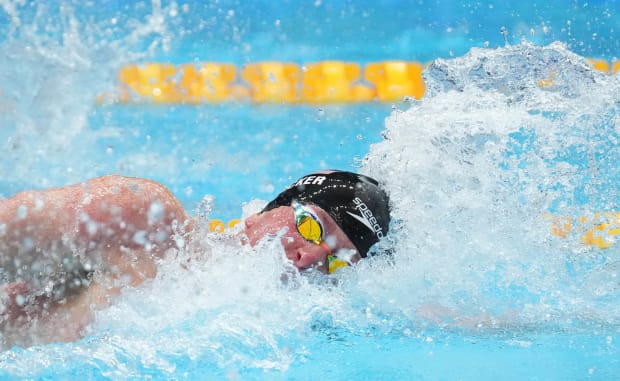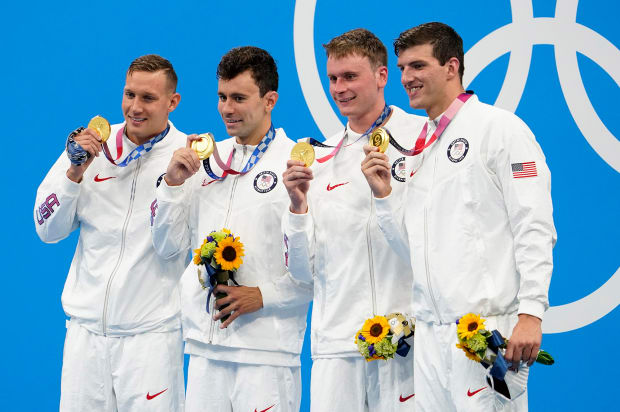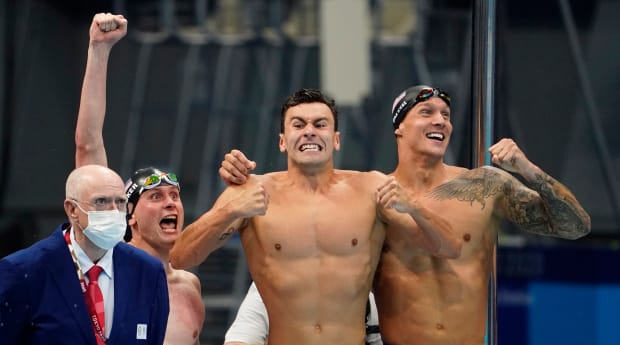From retired and waiting tables in Reno to the top of the swimming world, the 24-year-old U.S. swimmer is one of the least likely gold medalists in Tokyo.
TOKYO — The Lodge in Reno, Nev., will sell you a cup of coffee for $3-5, a glass of wine for $8-12, and a variety of food items from $8-22. The place has a patio that offers live music and views of the Sierra Nevada mountains. And if you ate or drank there in 2020, there is a chance that the waiter who served you is currently wearing an Olympic gold medal here.
“Still a little speechless on that,” says Bowe Becker, even with the evidence hanging around his neck at the Tokyo Aquatics Center Monday afternoon.
You can’t really blame Becker for failing to find the words to describe his path to this precious present. Olympic stories really don’t follow this story arc.
Becker quit the sport of swimming when the pandemic hit in spring 2020, leaving the postgraduate training group at Auburn and moving back home. He was done, burned out, says he didn’t touch the water for six months—which, in swimmer years, is full-on retirement. He thought about putting his criminal justice degree from the University of Minnesota to use, applying to become a Washoe County sheriff’s deputy. In the meantime, he worked at The Lodge to pay bills.

In less than a year’s time, Becker came back, reignited his passion for the sport and found himself doing extraordinary things. He qualified for the U.S. Olympic team, grabbing the last of five spots for the 4 x 100-meter freestyle relay. He swam fast enough in the preliminaries here to earn a spot on the finals relay. And then Becker’s third leg gave the United States enough separation for anchor Zach Apple to pull away and win the gold on an otherwise sobering day for U.S. swimming.
Katie Ledecky lost an individual Olympic race for the first time, albeit in an all-time classic showdown with Australian Ariarne Titmus. Torri Huske missed the medal podium by a single one-hundredth of a second in the 100-meter butterfly and Michael Andrew also finished fourth in the 100-meter breaststroke—neither swimmer capable of matching the times they put up in those events at Olympic Trials. After the six-medal rush to start the swimming competition, Monday morning was a reminder that the world isn’t going to roll over for the stars and stripes.
But the relay—that was strong. Caeleb Dressel is the headliner, winning the first of what could be six or seven medals. Apple is the guy who has developed into America’s next great relay swimmer, adding the close-out in this race to a couple of heroic legs at World Championships in Korea. Blake Pieroni is the Olympic veteran who earned a gold in this event in 2016.
Becker? He’s the one nobody saw coming. Himself included.

He was a great swimmer at Minnesota, but never found his way to the top step of the podium at NCAA championships, finishing second in the 100 free his senior year and third in the 50 as a junior. He’s never previously been part of the USA Swimming national team, which takes the top six in each event. He’d never represented the United States in an international competition.
And there was that whole thing about quitting the sport cold and becoming a waiter. “I really thought I was going to be done with swimming altogether,” Becker says.
Becker had moved his training base to Auburn after finishing his eligibility at Minnesota, but he wasn’t very happy there. With few friends, he felt out of his element and lost his joy for swimming. “I wasn’t in a good place when I was at Auburn, mentally and physically,” he says. “I went home and did a mental and physical reset.”
Becker had long been afflicted with rheumatoid arthritis, a painful condition that led to fluid buildup in his joints as a kid. That led him to swimming, although he still has to largely avoid running and has to be judicious with his work in the weight room. Medication has alleviated most of his symptoms, but it’s still something he’s aware of daily.
The bigger problem last year was simply finding a reason to keep swimming. That’s why he walked away. But then he got a call from another American relay hero from days gone by. Jason Lezak, general manager of the Cali Condors of the International Swimming League, reached out to see if Becker was still in racing shape. He said he was.
“Kind of lied there a little bit,” Becker recalls with a smile.
But that invitation was the spark he needed. After the ISL season in Budapest, Becker went back to his alma mater and threw himself into the sport again, enjoying the training group at Minnesota and putting in several months of quality practice. “I just put my head down and went to work,” he says.
America is full of more fast freestylers than any nation on Earth, but Becker was ready for his moment. In Omaha, he swam the three fastest 100-meter freestyles of his life to make the team. In Tokyo, he took it up another notch. Becker laid down the second-fastest time in the prelims to earn a spot in the final, and then came through again under pressure.

Dressel’s did his thing as the leadoff, blasting into an immediate lead and holding it throughout his leg—but he was only .26 ahead of France’s first swimmer, and others were in close pursuit as well. Pieroni only added a tenth of a second to the lead. When Becker dove in, the outcome was still very much in doubt.
When Becker got out, 47.44 seconds later, the Americans were still in the lead. They had placed the gold medal chase in the capable hands of Apple, who split a ferocious 46.69 to seal the deal by more than a second over runner-up Italy. “You can put him in any position and he’s going to get the job done for us,” Pieroni says of Apple.
For Dressel, his leadoff 47.26 was the fastest of the year and .65 faster than he went leading off the 2016 Olympic relay and earning his first gold medal. Dressel bawled after walking off the podium then, with veteran Michael Phelps rubbing his burr head. Five years later, Dressel was the veteran supporting the young bucks, none of whom had ever swam in an Olympic final before.
After the medal ceremony, Dressel took off his medal and chucked it to Curry in the stands, a show of solidarity with the prelim swimmer. Then he slung an arm around Becker’s broad shoulders for a few steps—America’s next golden boy and America’s former waiter, side by side.
In that moment, Bowe Becker had to be stunned by where life had taken him in less than a year. Even by the disruptive standards of a pandemic year, his Olympic journey was more uncertain and improbable than almost any other. From retired and bussing tables in Reno to the top of the swimming world, he’s one of the least likely gold medalists in Tokyo.
More Tokyo Olympics Coverage: